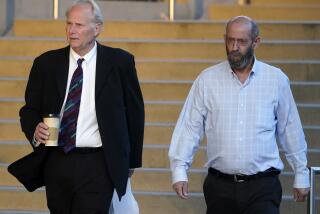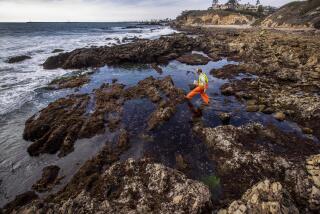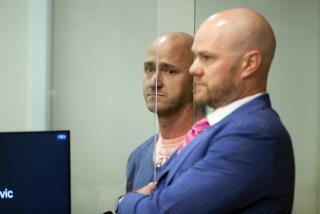Skipper Indicted on Felony Counts for Spill Damage
- Share via
ANCHORAGE — An Alaska grand jury returned felony indictments against former Exxon Valdez Capt. Joseph Hazelwood on Monday, holding him criminally responsible for the massive devastation caused by the nation’s largest oil spill, which continues to spread along the southern coast of Alaska.
Assistant Dist. Atty. Mary Anne Henry said the grand jury considered evidence that Hazelwood had been drinking, that he left the bridge in the hands of an unqualified third mate and that he was responsible for the ship’s automatic pilot being engaged during a portion of the maneuvers.
The indictment also said that his actions after the accident, in which he apparently tried to free the supertanker from the reef, caused additional damage to the ship and possibly contributed to the size of the spill.
For Hazelwood, who has become the lightning rod for public outrage over the tanker grounding and 11-million-gallon oil spill, the new charges overshadow earlier misdemeanor actions brought by the state. He now faces up to 10 years in prison and a $50,000 fine as a result of three counts of criminal mischief in the second degree, all of which allege that at various times he engaged in reckless conduct which contributed to the damage done by the tanker.
Dist. Atty. Dwayne McConnell said the state will ask to have all the charges consolidated into a single trial.
Hazelwood’s attorneys, contacted in New York, declined to comment before reviewing the state’s newest allegations. Earlier, however, they had accused Alaska of trying to make Hazelwood “a scapegoat for a system that went bad.”
“This was a pure accident--caused by a third mate and a helmsman who failed to follow the captain’s orders to turn the ship,” said Michael Chalos, one of the lawyers. “Alcohol problems played no role in this casualty.”
Accuses Exxon
Hazelwood’s attorneys also blamed the Coast Guard traffic control center for failing to monitor the ship and alert it to its hazardous course. And Chalos accused Exxon, which fired Hazelwood a week after the March 24 accident, of “participating in making him take all the blame.”
Separately, Exxon on Monday named Griffin B. Bell, attorney general in the Jimmy Carter Administration, counsel of a committee of outside directors formed to determine whether the company should sue present or former employees because of the Alaska oil spill.
“We are extremely pleased that a man of Mr. Bell’s distinction . . . is available for this critically important assignment,” said Jess Hay, chairman of the committee.
Hazelwood’s indictment came only two days after federal hearings on the disaster closed. The National Transportation Safety Board will issue its recommendations and findings of blame in a report expected early next year. By that time, Hazelwood’s fate should already have been decided, however.
Henry said she will request that Hazelwood stand trial here on both the felony and misdemeanor charges on June 20. He is free on $50,000 cash bail pending trial.
Nineteen people testified before the grand jury, including at least seven members of the crew. Gregory T. Cousins, the third mate who was at the helm when the tanker ran aground, declined to testify before the grand jury, another source close to the investigation said.
Also testifying were a number of Coast Guard officials and the port pilot, W. Edward Murphy. During the NTSB hearings, Murphy said he smelled alcohol on Hazelwood’s breath as the Exxon Valdez departed the oil terminal, but said he did not think Hazelwood’s judgment was impaired.
The actions against Hazelwood hinge on allegations that he was drunk at the time of the accident and performed recklessly. Other testimony before the NTSB confirmed that Hazelwood had been drinking in Valdez until a short time before the tanker’s departure the night of the accident.
Blood Alcohol Test
Tests taken about 10 hours after the ship ran aground on Bligh Reef showed Hazelwood had a blood alcohol reading of 0.06, compared to a Coast Guard requirement forbidding sailing with anything more than 0.04. A toxicology expert, noting the delay in testing the captain, told federal investigators last week that Hazelwood might have had a reading as high as 0.22 at the time of the accident.
Hazelwood’s attorneys dispute that claim, however, and note that everyone who encountered Hazelwood that night--from dock guards to the port pilot Murphy to crew members--testified that the captain did not seem impaired in any way.
The claims of reckless conduct stem largely from Hazelwood’s absence from the bridge when critical maneuvers were required. The ship was leaving the designated traffic lanes to avoid icebergs and passing close to shoals, reefs and islands when the captain retired to work in his cabin. He left Cousins, a third mate with limited experience in Prince William Sound and no pilot’s certificate, in charge of navigation.
By doing so, he “recklessly created a risk of damage to the property of others . . . by recklessly risking the structural integrity of the oil tanker Exxon Valdez through his actions,” the indictment charged.
In a clue to their defense strategy, attorneys for Hazelwood argued last week that the third mate, licensed to serve as a second mate, was well-qualified and, in fact, did not need a pilot’s certificate because the requirement had been waived previously by the Coast Guard.
Evidence submitted to the NTSB shows that such a waiver was being considered, at least. Whether it was waived--or whether Hazelwood would have reason to believe it was waived--figures to be an issue resolved in court.
Meanwhile, a worker on a ship helping clean up the spill was killed in an elevator accident Monday.
The death occurred aboard the Coastal Star, a headquarters ship anchored in Northwest Bay on Eleanor Island in Prince William Sound about 55 miles southwest of Valdez, Coast Guard Chief Mark Kennedy said. The food preparation worker was found pinned between a freight elevator and a bulkhead on the third deck.
The Coastal Star serves as a berthing vessel and command ship for the federal on-scene coordinator, Kennedy said.
More to Read
Sign up for Essential California
The most important California stories and recommendations in your inbox every morning.
You may occasionally receive promotional content from the Los Angeles Times.













